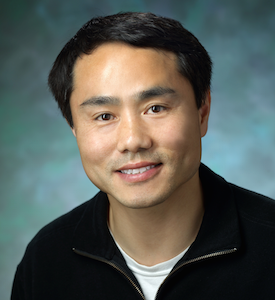Pan returns to lead Department of Physiology

By Deborah Wormser
Dr. Duojia Pan, a Howard Hughes Medical Institute Investigator, returned to UT Southwestern Medical Center on June 1 to become the new Chairman of the Department of Physiology.
“DJ,” as he is known to his friends, arrived on campus from the Johns Hopkins University School of Medicine, where he was a Professor of Molecular Biology and Genetics. Dr. Pan previously had served on the UT Southwestern faculty from 1998 to 2004.
“We are delighted that Dr. Duojia Pan has returned to UT Southwestern to become our new Chairman of the Department of Physiology and we are pleased to have his research and educational leadership,” said Dr. J. Gregory Fitz, Executive Vice President for Academic Affairs, Provost, and Dean of UT Southwestern Medical School.
“I am thrilled and humbled to return to my scientific roots in the Department of Physiology at UT Southwestern,” Dr. Pan said. “Physiology is an integrative discipline that draws upon nearly every aspect of modern biology. The diverse research interests of our faculty, from ion channel structure-function to stem cell physiology, provide a fertile ground for cross-pollination within and beyond the department and for training the next generation of scientists.
“I look forward to working with my colleagues in the Department and across the campus to build a world-class Physiology Department that stands at the forefront of biomedical research,” he added.
Dr. Pan is internationally known as the discoverer of the “Hippo” pathway of intracellular signaling. This pathway controls organ size in animals. As the name implies, aberrations in Hippo signaling give rise to cellular hyperplasia leading to hippopotamus-sized organs. In work that originated during his earlier tenure at UT Southwestern, Dr. Pan and his research team have elucidated many key players and molecular events in the Hippo pathway. In more recent research, Dr. Pan has shown that Hippo signaling plays important roles in regeneration and tumorigenesis, the process by which normal cells become cancerous.
In 2007, Dr. Pan led a team of researchers who demonstrated that blocking the Hippo pathway in mouse livers caused the organ to grow to five times its normal size, eventually resulting in cancer.
Dr. Pan is only the fifth Chairman of Physiology in UT Southwestern history, following in the footsteps of Dr. Arthur Grollman (1947-1950), Dr. Robert W. Lackey (1950-1964), Dr. Samuel M. McCann, (1964-1985) and Dr. James T. Stull (1986-2016), who returned to research.
The Department includes more than 25 faculty members who undertake research while also serving in prominent educational roles in both UT Southwestern Medical School and UT Southwestern Graduate School of Biomedical Sciences.
Dr. Pan is joined on the UT Southwestern faculty by his wife, Dr. Elizabeth Chen, who was recruited as Professor of Molecular Biology and a member of the Hamon Center for Regenerative Science and Medicine.
“Dr. Chen is an expert in cell-to-cell fusion, in particular the melding of individual myoblasts into skeletal muscles. She has recently discovered a novel mechanism of cell fusion that has implications for genetic and acquired degenerative diseases affecting muscle,” said Dr. David W. Russell, Vice Provost and Dean of Basic Research.
Dr. Pan received his undergraduate degree in biochemistry from Peking University and his Ph.D. from the University of California, Los Angeles. After postdoctoral training at the University of California, Berkeley, with Dr. Gerry Rubin, Dr. Pan joined the UT Southwestern faculty as an Assistant Professor of Physiology in 1998 and was promoted to Associate Professor with tenure in 2004. He was recruited to Johns Hopkins that year, and during his time in Baltimore, he was made an HHMI Investigator (2008), a Professor of Molecular Biology and Genetics (2009), a Fellow of the American Association for Advancement of Science (2012), and was awarded the Paul Marks Prize for Cancer Research (2013).
###
Dr. Fitz holds the Nadine and Tom Craddick Distinguished Chair in Medical Science, and the Atticus James Gill, M.D. Chair in Medical Science.
Dr. Russell holds the Eugene McDermott Distinguished Chair in Molecular Genetics.



